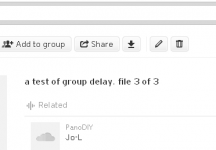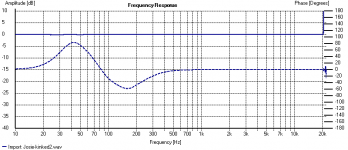Obviously not. It's being discussed right here, isn't it?
Indeed. Perhaps some nice fellow who is quick with Goldwave could prepare a couple of files like I suggested above to isolate the effect of group delay, and let people answer the question from experience rather than proclamation?
How did you do GD in Goldwave? I've never tried. Game to try it, tho.Indeed. Perhaps some nice fellow who is quick with Goldwave could prepare a couple of files....
High inductance on the woofer produces a slow deep bass which is almost like built-in bafflestep compensation. Low Inductance woofers produce fast lighter bass.
To be able to produce "fast" bass a woofer needs to have good HF response, typically one of the benefits of a low inductance woofer. Moot once you add a LP filter.
dave
Yeah, Helmuth - that's one way of looking at it. But I have no idea if the audibility stays at a constant product over the frequency range.
Someone here should know.
If it was half cycle the product would be 500 and there for full cycle 1000.
It makes a quick look at GD effect easy when it works this way.
Last edited:
It's all about the steepness of the slopes, isn't it? 
Group Delay gets worse with steep slopes. This applies to bass rolloff too, and if you can't hear that big closed boxes (2nd Order, 12dB per octave) are faster than reflex (4th Order, 24dB per octave) you must be deaf!
I'd reckon you can alleviate crossover midrange group delay issues with some time alignment between drivers and low order slopes.
Group Delay gets worse with steep slopes. This applies to bass rolloff too, and if you can't hear that big closed boxes (2nd Order, 12dB per octave) are faster than reflex (4th Order, 24dB per octave) you must be deaf!
I'd reckon you can alleviate crossover midrange group delay issues with some time alignment between drivers and low order slopes.
It's all about the steepness of the slopes, isn't it?
Hi,
Of course it is, which determines phase response. They
are all related, choose your position of the same thing.
rgds, sreten.
If you want to test this by listening, I've made some files for you. You'll recognize the song.  It has good content below 100Hz
It has good content below 100Hz
The audio file was split into 2 parts, one was 4th order low pass filtered at 100Hz, the other high pass filtered at 125Hz. The spread is because the filter is butterworth and combines flatter with the slight spread. The file was then recombined. Phase is rotated 180 degs at 110Hz (because of the spread) and continues down to 360 degs at DC. Or vice-versa, depending on how you look at it.
The files are here, you can download them. About 1 min long, each 2.2meg in 320KBS mp3 format. Can you tell which was manipulated, and which was not? Or at least if there is a difference or not between the 3?
The audio file was split into 2 parts, one was 4th order low pass filtered at 100Hz, the other high pass filtered at 125Hz. The spread is because the filter is butterworth and combines flatter with the slight spread. The file was then recombined. Phase is rotated 180 degs at 110Hz (because of the spread) and continues down to 360 degs at DC. Or vice-versa, depending on how you look at it.
The files are here, you can download them. About 1 min long, each 2.2meg in 320KBS mp3 format. Can you tell which was manipulated, and which was not? Or at least if there is a difference or not between the 3?
I don't think you'll spoil the fun.  Let us know what you hear or don't hear. I'll post which files are which later.
Let us know what you hear or don't hear. I'll post which files are which later.
This is almost an ideal filter, so there is only phase rotation with a tiny bit of ripple circa 100Hz.
If I can figure out how to simulate other types of phase delay, I will.
This is almost an ideal filter, so there is only phase rotation with a tiny bit of ripple circa 100Hz.
If I can figure out how to simulate other types of phase delay, I will.
hello,
just try with a convolver,(foo convolve,vst convolver for win amp or other vsthost).also you can record what you are hearing and share the modified file.
with rePhase,generate a flat response,and delay (or anticipate )low freqency as you wish.(linearzation tab )
to reverse time,use general tab,inv tab at the bottom
you will get two impulse to try in a convolution engine...and check by listening.
(this a flat response in magnitude for the two IR).
just try with a convolver,(foo convolve,vst convolver for win amp or other vsthost).also you can record what you are hearing and share the modified file.
with rePhase,generate a flat response,and delay (or anticipate )low freqency as you wish.(linearzation tab )
to reverse time,use general tab,inv tab at the bottom
An externally hosted image should be here but it was not working when we last tested it.
you will get two impulse to try in a convolution engine...and check by listening.
(this a flat response in magnitude for the two IR).
An externally hosted image should be here but it was not working when we last tested it.
Last edited:
I did exactly this test circa 1978 Is Linear Phase Worthwhile?
It used All-Pass networks. (All the evil LR filters give this as an end result. )
)
My Blind Listenng Tests detected audibility with certain test signals with about 2ms delay below 1kHz but nothing on music.
Much later, the same 2ms was detected on some careful drum recordings using much better equipment but none of this was published. This ties in with other people's work on audibility around 100Hz in the same period.
There are 2 questions to ask in all such tests.
___________
For yus guys who ascribe 'fast' or 'slow' bass to ported or sealed boxes etc, may I suggest you check this using Blind Listening Tests. Just my $0.02
It used All-Pass networks. (All the evil LR filters give this as an end result.
My Blind Listenng Tests detected audibility with certain test signals with about 2ms delay below 1kHz but nothing on music.
Much later, the same 2ms was detected on some careful drum recordings using much better equipment but none of this was published. This ties in with other people's work on audibility around 100Hz in the same period.
There are 2 questions to ask in all such tests.
- Is the difference audible? Only if the answer is YES do you ask the 2nd.
- Which one is preferred?
___________
For yus guys who ascribe 'fast' or 'slow' bass to ported or sealed boxes etc, may I suggest you check this using Blind Listening Tests. Just my $0.02
Group delay measurement is an expression for rate of change of phase; slope of phase. It is not a property limited to audio.
Measurement starts with impulse response.
Creating system for assessing audible differences <100Hz requires a defined response, and then being able to modify phase response. To this end insertion of various all pass filters is indeed a good suggestion.
Most headphone have horrible response in region of interest. Virtually any woofer system of reasonable size also has horrible response in region of interest.
DSP allows for correction, and then it becomes possible to listen.
Here is response of highly corrected cardioid woofer system comprised of two 12" drivers; one in 'U' frame, the other sealed:
Frequency response:

Phase:

Group Delay:

I cross this into various similarly corrected two way speakers, and the difference is night and day. Articulation is exceptionally good. I haven't spent time looking for a GD threshold.
Regards,
Andrew
Measurement starts with impulse response.
Creating system for assessing audible differences <100Hz requires a defined response, and then being able to modify phase response. To this end insertion of various all pass filters is indeed a good suggestion.
Most headphone have horrible response in region of interest. Virtually any woofer system of reasonable size also has horrible response in region of interest.
DSP allows for correction, and then it becomes possible to listen.
Here is response of highly corrected cardioid woofer system comprised of two 12" drivers; one in 'U' frame, the other sealed:
Frequency response:

Phase:

Group Delay:

I cross this into various similarly corrected two way speakers, and the difference is night and day. Articulation is exceptionally good. I haven't spent time looking for a GD threshold.
Regards,
Andrew
If you want to test this by listening, I've made some files for you. You'll recognize the song.It has good content below 100Hz
The audio file was split into 2 parts, one was 4th order low pass filtered at 100Hz, the other high pass filtered at 125Hz. The spread is because the filter is butterworth and combines flatter with the slight spread. The file was then recombined. Phase is rotated 180 degs at 110Hz (because of the spread) and continues down to 360 degs at DC. Or vice-versa, depending on how you look at it.
The files are here, you can download them. About 1 min long, each 2.2meg in 320KBS mp3 format. Can you tell which was manipulated, and which was not? Or at least if there is a difference or not between the 3?
i don't think this is a way to modify group delay.(if i've understood what you've done
reverse polarity of the low pass will only affect the recovery region.
group delay is define by -(delta phase/delta frequency)
no more phase delay when reverse polarity.
An externally hosted image should be here but it was not working when we last tested it.
the two group delay are the same.
An externally hosted image should be here but it was not working when we last tested it.
what issue do you have with HOLM ?
may i can help.
- Status
- This old topic is closed. If you want to reopen this topic, contact a moderator using the "Report Post" button.
- Home
- Loudspeakers
- Multi-Way
- We can not hear group-delay under 100Hz?

